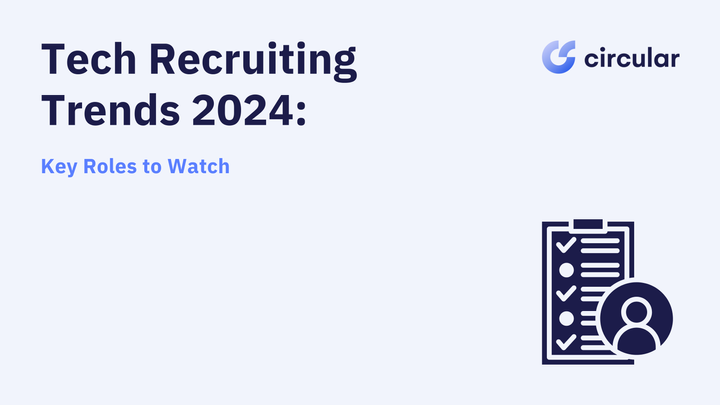A view of the technical skills you should prioritize as a developer, based on the comments from our team & audience, and also on your current role and the career path you wish to pursue.
76% of candidates on Circular are rejected due to technical reasons: lack of fit with the background, not being familiar with the stack, and not having enough technical experience. Therefore, it seems difficult to check all of the technical and soft skill boxes during the hiring process.
When it comes to the most sought-after technical skills, The Coding Game survey highlighted a wide range of technologies, including AI, machine and deep learning, web development, DevOps, database software, and cloud computing, among others.
In this article, we will share which technical skills you should prioritize, based on the comments from our team & audience, and also on your current role and the career path you wish to pursue.
Programming languages
The ability to program in multiple languages is one of the most important technical skills for developers. While some languages are more popular than others, being able to write code in multiple languages provides developers with a much broader set of options when it comes to finding a job or developing a new project. Moreover, knowing multiple languages makes learning new ones easier because many of them share common features and syntax.
StackOverflow did an excellent job with its annual developer survey. In the 2021 edition, they asked 58,031 professional developers who were the most widely used programming languages in the industry. Here is what the audience replied.
Did you know there is a subclass of programming languages that has recently become a hot topic in the software industry?
They're called Object-oriented programming languages (“OOP”). We believe OPP is popular because it saves time during development.
We can see from our Circular job pools that OPP are the most demanded skill in open positions. More specifically, the most in-demand languages in Circular are Java, Node, and Python.
Data structures and algorithms
As a developer, you don’t need knowledge about data structures and algorithms (DSA) to code. However, they will help you master software solutions.
We have reviewed some Quora threads talking about DSA and there is an answer from Imtiaz Mohammad we found particularly interesting;
To solve problems correctly, efficiently and elegantly.
Why do you learn data structures and algorithms?
To solve problems which cannot be solved using math (alone), correctly, efficiently and elegantly."
FYI
When looking for senior software developers, product-based companies such as Meta, Amazon, Google, and Microsoft prioritize data structures and algorithm developers over others. Not surprising, given that developers face extremely complex problems in these companies, and testing their abilities to offer efficient solutions to these problems is a requirement in their interviewing processes.
Data
We are all aware that data is imperative because it allows us to understand how the company is performing and continuously improve products/services in order to ensure the health and prosperity of the business. The way that companies collect, manage, and extract large amounts of information is critical. Data profiles and data teams have become essential.
When it comes to data, there are several roles that you can play in this field.
A data engineer's primary responsibility is to prepare data for analytical or operational use, which necessitates the acquisition of certain skills. Companies like Amazon, for example, require proven experience and knowledge working with SQL, ETL design, data pipeline, data modelling, data architecture, and cloud analytics platforms.
Meanwhile, data analysts work with data to help their organizations make better business decisions. When it comes to data analysts, they require experience working with SQL; advanced Microsoft Office skills, particularly Excel and analytical platforms; data analytics with workflow management; cloud analytics platforms; big data analytics, anomaly/outlier detection; and E2E Process Optimization.
Data scientists, on the other hand, "a growing sector," analyze, test, aggregate, optimize, and present data to the company. The technical skills required vary depending on the data scientist role you seek. For example, Google requires knowledge of statistical software (such as R and Python) and database languages (e.g., SQL). They need to also be comfortable creating machine learning and artificial intelligence models and have a math and statistical background.
Additionally, Data roles are becoming popular as the pay is highly competitive.
We have asked José A. San Miguel, Data Team Manager at Inspide, who has relevant experience managing and hiring data profiles.
When interviewing candidates, José found that candidates apply to positions that include the word "data" without looking at the job detail. Behind all the roles and job titles related to data, it is important for you to review what companies are looking for, if your profile matches, and if they can fulfil your expectations.
José highlighted that some developers with different roles (e.g. product, marketing, etc.) who are interested in data are trying to jump straight into data science, which is "similar to trying to climb Everest without training."
We fully agree with José. Before applying, we believe it is critical to understand the company's needs and roles.
AI
According to a UiPath survey, 70% of C-level executives would like even non-technical employees to have some automation and AI skills.
Although AI is a relatively new field, 43% of businesses use some form of AI.
You can work on AI through various positions. For developers, the most in-demand skills are Python, Java, TensorFlow, and R.
How can you learn this if you are currently employed as a developer? When working for startups or tech companies, the most common use of AI is to reduce manual and repetitive procedures as the company grows. Try to be part of the engineering teams that build internal tools for the Ops teams. The purpose of them is generally to reduce the load for those who work in operations and to be able to scale the company in a healthy way using some kind of AI.
Cloud
Currently, 92% of enterprises use the cloud, and adoption has been steadily increasing in recent years. COVID, rather than being an impediment, became a facilitator as companies' needs shifted to a more remote and digital environment. The cloud represents the present.
From a technical standpoint, it is clear that the cloud facilitates software engineers to easily set up and maintain solutions. Aside from its ease of use, businesses push to go to the cloud because it promotes cost-effectiveness and enables business growth through scalability.
Due to the nature of their business and the size of their teams, some companies have cloud teams and hire cloud engineers directly. However, cloud experience is now often listed as a requirement for backend developer roles.
As of today (1 August), 37% of our backend open roles require familiarity with cloud technologies.
Cloud experience is not only mentioned in backend positions; it is also mentioned in frontend positions, specifically, those that code with Node or work on projects that require a direct connection to the server.
If you are a backend developer interested in switching careers to cloud roles but lack experience, we recommend that you look for companies that value developers doing work around the cloud. You will be able to sign in with the cloud computing provider of your company, they provide tutorials and documentation on how to use it. Asking for internal workshops around the cloud or attending external ones can be also a good starting point.
If you are a backend developer with little experience with the cloud, it would be beneficial for you to begin building stronger knowledge as this is becoming increasingly important.
Product Expertise
Depending on the developer role you play on your team, your work can have a direct or indirect impact on the product/service you are creating. The importance of the developer role is growing in product projects, and new job titles such as product developer or product engineer are emerging.
Javier Aceituno, Head of Engineering at Circular.
Whether you have a direct or indirect impact on the product you're developing, understanding the business will help you to maximize your contributions.
Furthermore, if you work or want to work in a multidisciplinary team developing new features and resolving complex issues, your product and user knowledge will determine your success.
But how do you increase product sensitivity? You can improve your skills by using or testing the product yourself and spending time shadowing the Operations team.
Furthermore, candidates who try the product during the hiring process make a great first impression and demonstrate an interest in the company.




